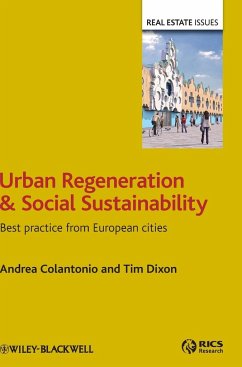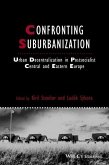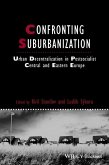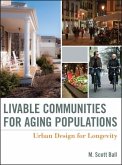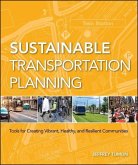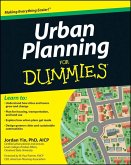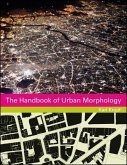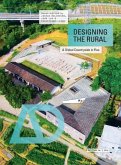This book examines how sustainable urban regeneration is being approached from a social sustainability perspective. It identifies and examines socially sustainable urban regeneration models, vehicles and best practice measurement systems across five key European cities, including exemplar and innovative sustainability metrics and tools. It analyses sustainable urban regeneration from a built environment viewpoint, which is relevant at policy, industry and academic levels.
Urban regeneration is a key focus for public policy throughout Europe. This book examines social sustainability and analyses its meaning and significance - an area of research which has, until now, been comparatively neglected. The authors offer a comprehensive European perspective to identify best practice in sustainable urban regeneration in five major cities in Spain, Italy, Netherlands, Germany, and the UK.
Urban Regeneration & Social Sustainability: best practice from European cities examines the extent to which social sustainability is incorporated within urban regeneration projects in the EU, but also investigates how local authorities, developers, investors and other key stakeholders approach sustainability. The book covers the recent economic recession and the growth of responsible investment (RI) and corporate responsibility (CR) agendas of investors and developers. It also provides a thorough analysis of the current metrics and tools used by the public, private and NGO sectors to implement, measure and monitor social sustainability. A range of urban regeneration models and vehicles are reviewed, with a particular emphasis on public private partnerships (PPPs) and EU structural funds, and a new framework for assessing social sustainability is described.
City-specific case studies examine regeneration projects in which institutional arrangements, financial products and tools, monitoring and measurement systems for social sustainability and stakeholders' participation in PPPs have delivered successful urban regeneration.
This comprehensive, systematic and authoritative overview of both the scholarly literature and current best practice across Europe makes the book essential reading for researchers and post-graduate students in sustainable development, real estate, geography, urban studies and urban planning, as well as consultants and policy advisors in urban regeneration and the built environment.
Provides a comprehensive European perspective, comparing case studies across five cities and identifying best practice in sustainable urban regeneration by focusing on social sustainability
Defines and shows how social sustainability (a key aspect in sustainable development) can be assessed, measured and monitored within urban regeneration projects
Takes a real estate 'institutional' focus by examining the role of key stakeholders within the property development industry and the public sector
Examines detailed studies of urban regeneration projects in Spain (Sant Adria de Besos), Italy (Turin), Netherlands (Rotterdam), Germany (Leipzig), and the UK (Cardiff)
Sets the research in the context of the recent economic recession and the growth of responsible investment (RI) and corporate responsibility (CR) agendas of investors and developers
Is based on a major three year independent, funded programme of research through the European Investment Bank's EIBURS programme.
Urban regeneration is a key focus for public policy throughout Europe. This book examines social sustainability and analyses its meaning and significance - an area of research which has, until now, been comparatively neglected. The authors offer a comprehensive European perspective to identify best practice in sustainable urban regeneration in five major cities in Spain, Italy, Netherlands, Germany, and the UK.
Urban Regeneration & Social Sustainability: best practice from European cities examines the extent to which social sustainability is incorporated within urban regeneration projects in the EU, but also investigates how local authorities, developers, investors and other key stakeholders approach sustainability. The book covers the recent economic recession and the growth of responsible investment (RI) and corporate responsibility (CR) agendas of investors and developers. It also provides a thorough analysis of the current metrics and tools used by the public, private and NGO sectors to implement, measure and monitor social sustainability. A range of urban regeneration models and vehicles are reviewed, with a particular emphasis on public private partnerships (PPPs) and EU structural funds, and a new framework for assessing social sustainability is described.
City-specific case studies examine regeneration projects in which institutional arrangements, financial products and tools, monitoring and measurement systems for social sustainability and stakeholders' participation in PPPs have delivered successful urban regeneration.
This comprehensive, systematic and authoritative overview of both the scholarly literature and current best practice across Europe makes the book essential reading for researchers and post-graduate students in sustainable development, real estate, geography, urban studies and urban planning, as well as consultants and policy advisors in urban regeneration and the built environment.
Provides a comprehensive European perspective, comparing case studies across five cities and identifying best practice in sustainable urban regeneration by focusing on social sustainability
Defines and shows how social sustainability (a key aspect in sustainable development) can be assessed, measured and monitored within urban regeneration projects
Takes a real estate 'institutional' focus by examining the role of key stakeholders within the property development industry and the public sector
Examines detailed studies of urban regeneration projects in Spain (Sant Adria de Besos), Italy (Turin), Netherlands (Rotterdam), Germany (Leipzig), and the UK (Cardiff)
Sets the research in the context of the recent economic recession and the growth of responsible investment (RI) and corporate responsibility (CR) agendas of investors and developers
Is based on a major three year independent, funded programme of research through the European Investment Bank's EIBURS programme.

